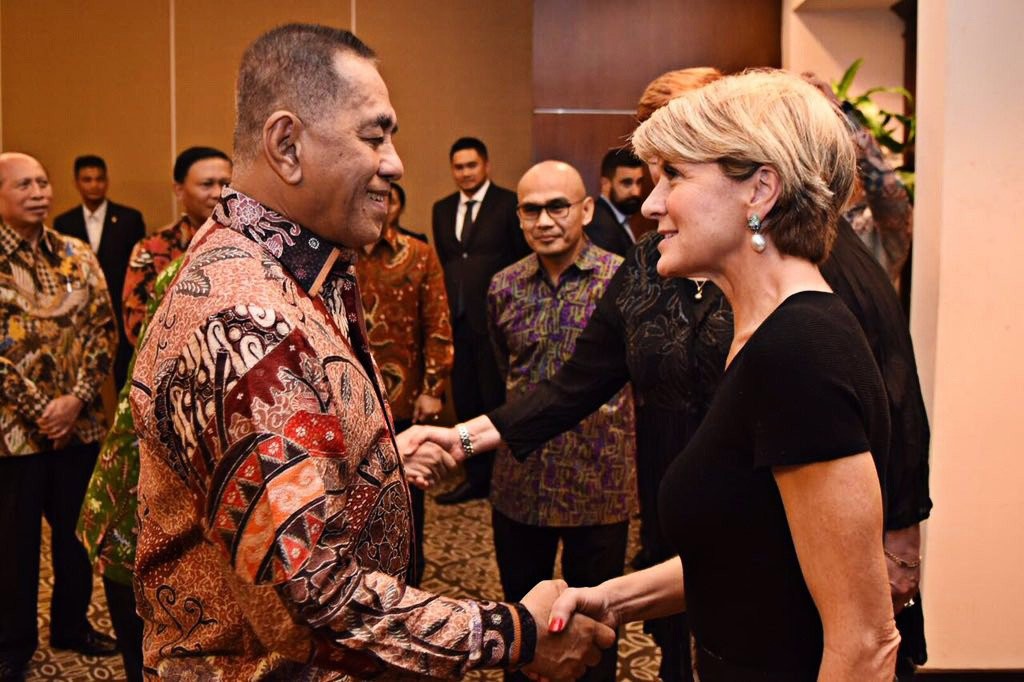Popular Reads
Top Results
Can't find what you're looking for?
View all search resultsPopular Reads
Top Results
Can't find what you're looking for?
View all search resultsIndonesia, Australia ties intact despite military kerfuffle
Change text size
Gift Premium Articles
to Anyone
R
elations between Australia and Indonesia remain intact despite the latest military stumble that has resulted in an ongoing suspension of defense cooperation, observers have said.
Institute for Defense, Security and Peace Studies executive director Mufti Makarim underlined that major calls on international military cooperation could only be made by executive decision.
Indonesian Military (TNI) chief Gen. Gatot Nurmantyo only suspended a small part of a cooperative partnership on education and training with the TNI’s Australian counterpart, he said, questioning Gatot’s capacity to make the decision.
“There will not be any macro impact on the relations between the two countries based on this case,” Mufti told The Jakarta Post over the phone on Thursday.
(Read also: TNI temporarily halts cooperation with ADF over insult)
Gatot said in a statement late on Wednesday that the TNI had accepted an apology conveyed by Australian Army chief Lt. Gen. Angus Campbell during a meeting in Jakarta on Wednesday. The apology came about following an investigation into offensive training material found at a military training facility in Perth in October.
The statement noted that Australia claimed the material was “not a reflection of the institution but rather that of individual personnel”, adding that the Australian Defense Force had taken steps by evaluating the facility, curriculum and imposing sanctions on those involved.
Gatot has not yet decided to resume full cooperation, saying that he would first need to report to the defense minister and the foreign minister before eventually meeting with President Joko “Jokowi” Widodo to discuss the future direction of the cooperation.
The kerfuffle started when a visiting language trainer from the Army’s Special Forces (Kopassus) found that the curriculum at the Perth training facility discredited the TNI for its alleged human rights abuses in East Timor and encouraged the restive Papua region to separate from Indonesia. Also found was a laminated paper depicting a tweaked version of the state ideology of Pancasila, changing it to become “Pancagila,” or “five crazy principles.”
Gatot then suspended interactions with Australia in January while Defense Minister Ryamizard Ryacudu said bilateral relations continued to be healthy.
(Read also: INSIGHT: Indonesia-Australia relations and the perils of success)
Meanwhile, defense analyst Connie Bakrie said Indonesia would continue to foster good relations despite the incident. She noted there should be a focus on analyzing the root cause behind the distortion of Pancasila.
“What needs to be stressed is to actually see how “Pancagila” could come about, including how long it’s been used and how many batches of it have gone through in the training facility,” Connie told the Post, adding that the risk that it had existed for an extended period of time could point to flaws in the curriculum.
She also noted that Indonesia would be careful to maintain good relations with Australia. As a prominent ally of the United States, and with an expected reduction in America’s military presence in the Asia Pacific under US President Donald Trump, Australia could shift into a growing power, Connie said.
Meanwhile, Iis Gindarsah, a defense expert at the Centre for Strategic and International Studies (CSIS), said dynamic relations between Indonesia and Australia were inevitable, noting that both countries were democratic nations with vibrant civil societies.
“The biggest challenge for a stable bilateral partnership remains how to prevent sensitive issues relating to law enforcement and homeland security disturbing ongoing defense and military cooperation,” he said.
The neighboring countries have experienced ups and downs, with the last major suspension of military cooperation occuring in 2013 following the revelation that Australian intelligence had attempted to spy on Indonesia by tapping the phones of then president Susilo Bambang Yudhoyono, his wife and his inner circle.
Coordinating Political, Legal and Security Affairs Minister Wiranto recently said President Jokowi was expected to visit Australia on Feb. 26.







